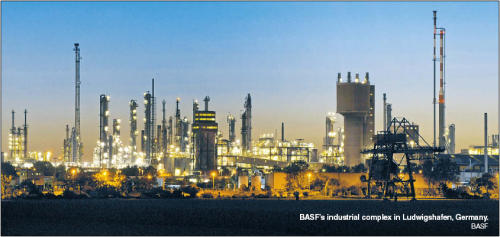Chemical firm also aims to boost presence in Asian construction marketLUDWIGSHAFEN, Germany ― Chemical plants have been associated with toxic materials harming the air, water and ecosystem, a major hurdle to the industry’s sustainable growth.
BASF, a leading global chemical firm, shows how technology, strategy and devotion to the community can tackle these challenges.
The company based in Ludwigshafen, southwest of Germany, runs Europe's largest chemical factory park on around 7 square kilometers of land.
The city’s more than 160,000 residents, including 33,000 BASF employees, enjoy clear sky, shining stars and the clean water of the Rhine.
The firm is highly respected by the local community and was chosen as one of world’s most admired chemical firms by Fortune magazine in 2008, thanks to its commitment to sustainable growth and the community.
“For us, sustainable enterprise means combining economic success with environmental protection and social responsibility, thus contributing to a high quality of life for today’s and coming generations,” BASF chief executive Jurgen Hambrecht said.
The chemical producer’s efforts to organize a community- and eco-friendly environment include operating an energy-efficient production base called “Verbund,” and adopting active self-monitoring system, it said.
“The company is very community-conscious particularly because most employees live near the production site. If the water is contaminated and odor is detected from there, it can directly influence the lives of their families,” a BASF official said.
BASF’s Verbund, meaning “integration” in German, is a unique production system that the company introduced in the end of the 19th century, it said.
Products flow through 2,000 kilometer-long pipelines among 160 plants in the Ludwigshafen complex, allowing an efficient use of resources such as energy and information, according to the firm.
This has particularly helped the firm realize an efficient operation, saving around 500 million euros ($688 million) a year, officials said.
Alongside the Verbund, the firm also adopts a unique, high-tech self-monitoring system as it prioritizes safety.
Its Environmental Center and Fire Department cannot be seen in most other chemical production sites anywhere in the world, officials said.
At the Environmental Center, 22 employees monitor the environmental parameters on site and in the surrounding areas on 24/7 shifts using cameras, microphones, special analyzers and measuring stations.
Its main responsibility, according to the firm, is to detect and prevent air, noise and water pollution. The staff frequently checks whether there are harmful substances such as sulfur dioxide emitted from their plants and ensures water quality through a special sewage plant.
BASF has also been operating the Fire Department, which has monitored its site in Ludwigshafen in alliance with local authorities for more than 100 years, according to the firm.
The fire station, equipped with 43 vehicles, an emergency hotline and 180 experienced firefighters, is dedicated to preventing hazards in the area, officials said.
Founded as Baden Anline & Soda Factory in 1865, BASF started off as a dyes producer but over time has become a leading firm whose business portfolio encompasses chemicals, plastics, performance products, agriculture products, and oil and gas.
The firm currently has five Verbund sites outside Germany including Kuantan, Malaysia and Nanjing, China, plus 330 other production sites.
BASF posted sales of 63.9 billion euros in 2010, up 26 percent from a year earlier, and earnings of 4.5 billion euros.
Energy-efficient construction
In recent years, BASF has been stepping up efforts to provide its customers with energy-efficient chemical products, officials said.
Its focus has been on nurturing its construction sector, mainly in the prospective Asian market, as a new growth driver, said Tilman Krauch, head of global construction steering committee.
The sector accounted for 10-15 percent of the firm’s total sales as of 2009, according to the firm.
The firm has thus been searching for diverse partnerships with its Asian counterparts in Korea, Singapore and Japan, Krauch said.
BASF is, for example, currently the largest supplier for Masdar City, a carbon-free urban area project which Abu Dhabi, United Arab Emirates, aims to complete by 2025, he added.
The Masdar city expected to rely solely on clean energy sources such as solar and wind power, and generate no waste or carbon emission.
In Europe, meanwhile, BASF has been providing innovative insulation materials and constructing energy-efficient housing using them. They are Neopor, expandable polystyrene, and Basotec, which is a flexible, open cell foam made from melamine resin, a thermoset polymer.
The Luwoge GmbH, BASF’s subsidiary specializing in housing, has built multiple low energy-consuming flats called “3-liter” and “1-liter” houses, which respectively require regarding amount of fuel a year respectively to heat them.
“Three-liter houses can reduce energy consumption and carbon emission by 70 percent and 80 percent respectively,” said Andre Zaman, planning & project manager of Luwoge GmbH.
“Though the housing types are in the starting stage of adoption for now, most apartments will be built under such standards here in the future.”
BASF Korea has also created a test-bed in collaboration with local builder Daelim Industries in Yongin, Gyeonggi Province, in 2005.
Daelim and other local builders are said to have been seeking ways to adopt such type of housing to Korean apartments.
By Koh Young-aah (
youngaah@heraldcorp.com)
(Korea Herald correspondent)






